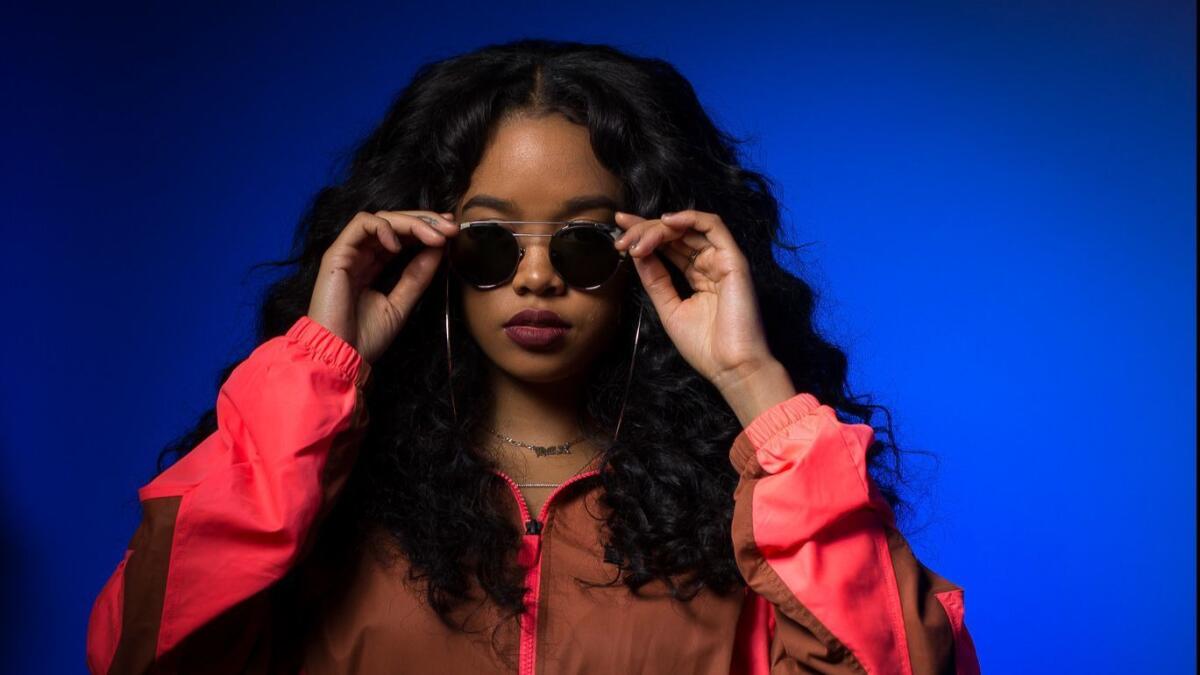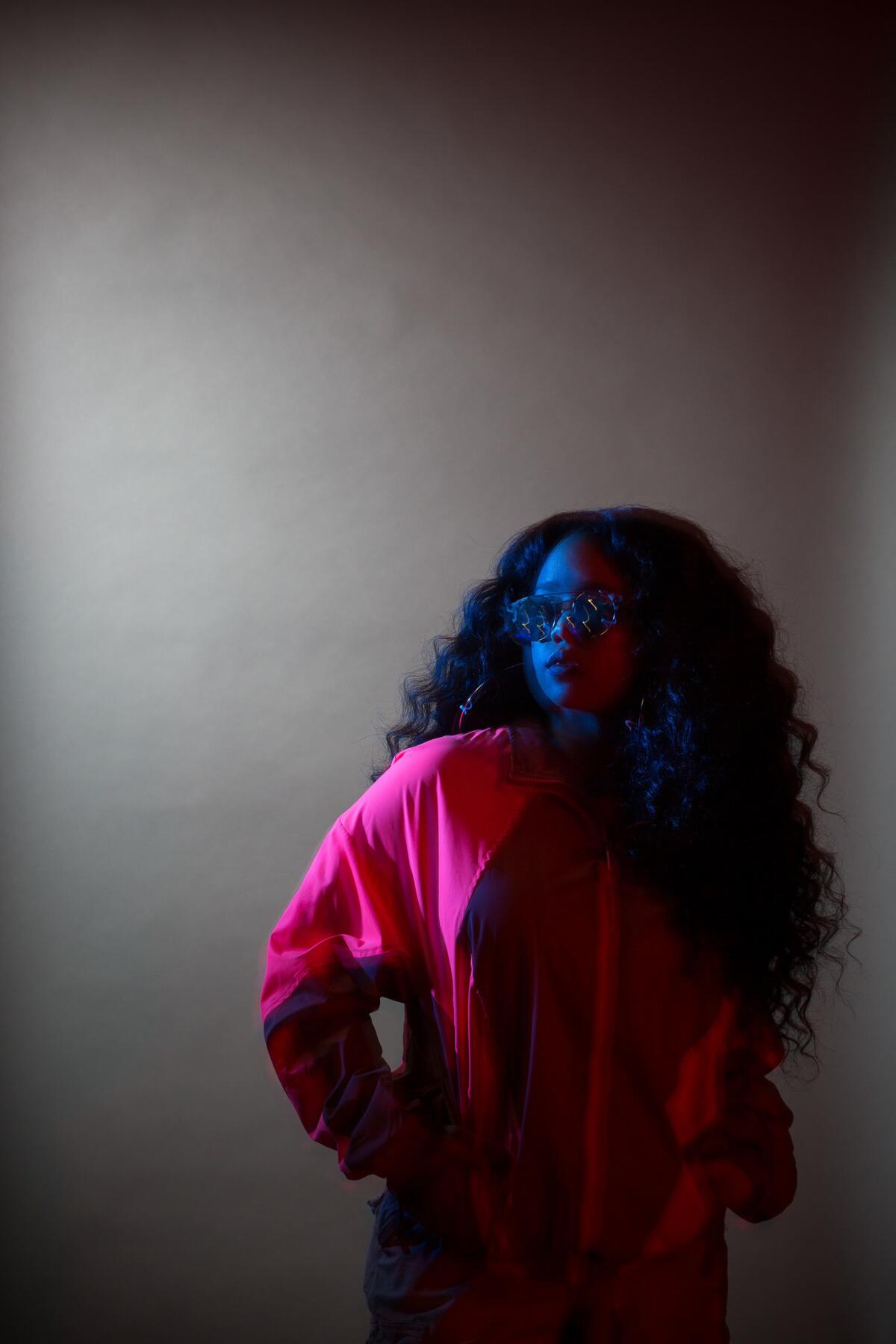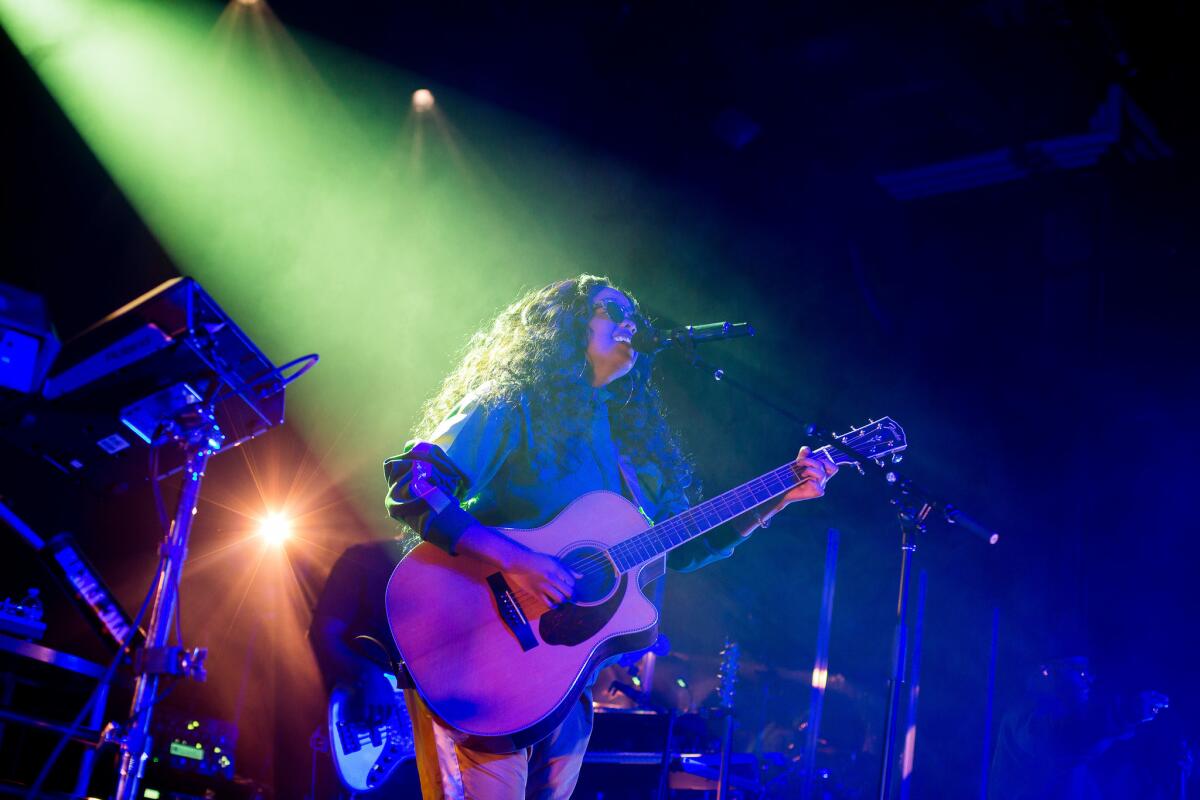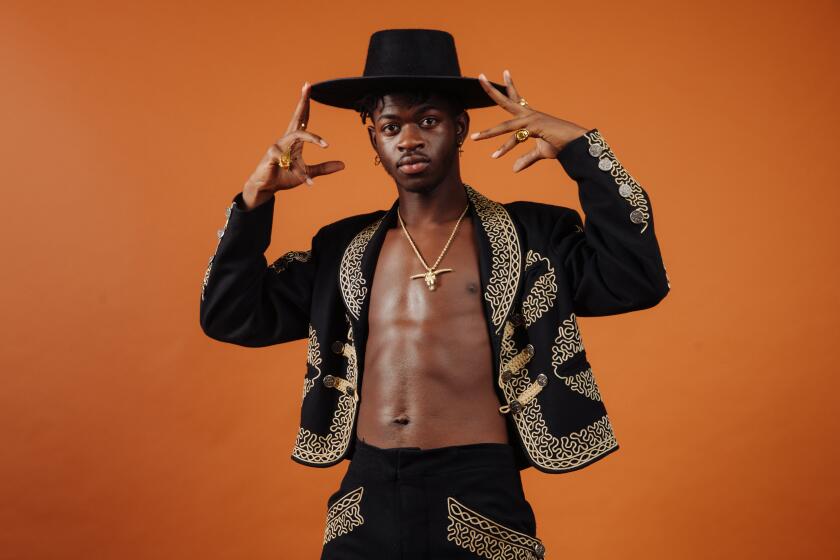H.E.R. went from child star to enigmatic R&B sensation — on her terms

- Share via
Just a few years ago, the thought of an artist like H.E.R. breaking out seemed impossible.
She’s a multi-instrumentalist performing contemporary rhythm and blues in the truest sense. Her music is steeped in complex melodies, lush arrangements and deeply personal lyrics — a near-radical approach considering hip-hop’s influence on pop music is so pervasive it rendered R&B nearly indistinguishable from rap for much of the past decade.
For quite some time, emerging voices in R&B have been pivoting toward the fringes of hip-hop or leaning on emcees to bolster their music — that is, if they wanted a chance at mainstream exposure.
But not H.E.R.
The 21-year-old stayed true to her core and pierced the bass rattling sounds of rap with several EPs bursting with brooding, slow dripping soul anchored by a velvety, rich voice that announced H.E.R. as one of the most exciting R&B talents in recent years. And she’s not alone. She’s part of a new generation of artists ushering in a new era for the genre — one informed by R&B tradition.
“People want to listen to something they can feel,” she said while resting up before a recent show at Detroit’s Royal Oak Music Theatre. “Yes, people want to have fun and turn up, but people also want to hear raw, genuine emotions. I think that's why I've cut through and that's why there’s a surge of R&B artists cutting through. People want authenticity and genuine, raw emotion.”
The woman behind H.E.R. — an acronym that fittingly means Having Everything Revealed — is (mostly) anonymous, a rarity in 21st century stardom, where fans expect near-unfettered access to celebrities as social media has grown into a vital promotional tool and a direct extension of an artist’s brand.
However, interviews and access to the singer’s visage were limited as she wanted to keep the focus on the music and not what she looks like or dishing on her personal life. In fact, she’s rarely captured without oversize shades and her curly tresses partially obscuring her face, and her shows are dimly lit affairs.
That enigmatic approach is a bold move for any newcomer, but it’s an especially risky move for a young artist breaking into a genre that has been relegated to the sidelines as hip-hop’s increasing dominance altered the pop landscape.
So far, though, it’s paid off.
H.E.R.’s records have been streamed over 1 billion times, she just scored her first platinum and gold singles, Janet Jackson and Rihanna are counted among fans, she’s up for five Grammys — including new artist and album of the year — and she is wrapping up her second headlining tour, all without having yet released a proper full-length album.
“It's all kind of surreal,” she says. “I’ve really been trying to live in the moment and savor everything that’s happened this year. It’s a hard thing to do when so much is happening at once, but I’m trying to find that balance.”
Given her nomination for album of the year, it’s almost certain she’ll be invited to perform during the ceremony and, outside of the major races, she’s up for R&B performance, R&B song and R&B album. When asked if she’d ever daydreamed about gracing the Grammy stage or clutching a trophy, her answer was an emphatic one: “Hell, yeah!”
“I practiced my Grammy speech as a child. I've literally imagined that moment over and over again throughout the years, so it's very special to me. Win or not, I just want it to be the exact moment that I imagined,” she says.
“Grammys is ultimately No. 1 and always will be. It's always in the back of my mind, but it’s not about the accolades at all. For me, what matters the most is that feeling of being onstage connecting with people.”

I did exactly what I wanted to do, and that's make people focus on the music ... [and] not what I look like
— H.E.R. on her enigmatic approach to music
Gabriella "Gabi" Wilson grew up surrounded by music.
She was raised in Vallejo — a small waterfront city in the North Bay — where family “jam” sessions in the living room were a frequent occurrence. Wilson’s father, a veteran musician, nurtured his daughter as she mastered the piano, drums, guitar and bass, and by the time she was 9, she was writing her own songs.
Called one of America's most talented kids at 11, Wilson was featured on Radio Disney, landed a record deal with RCA at 14 and received guidance from her idol, Alicia Keys. There’s footage of an adolescent Wilson belting a little-known track by Keys buried quite deep on YouTube.
At 17, she emerged on the BET Awards stage with a sizzling performance of her debut single, “Something to Prove,” where she quite literally shredded her way through the Isley Brothers-inspired scorcher, stealing the night.
And then she vanished.
Wilson resurfaced in 2015 with a stunning, soulful take on Drake’s moody, ’90s R&B throwback “Jungle” that she released on her SoundCloud. The cover is what tipped the public off to the true identity of H.E.R, who included the track on her debut EP, 2016’s “H.E.R. Volume 1” — a project shrouded in so much secrecy that her label, RCA, declined to offer biographical information, promotional shots featured just the singer's silhouette, and when she agreed to let me be the first journalist to interview her, it came with the caveat that it be over the phone (we met face-to-face for her first sit-down chat nearly a year later).
"This was the best way for me to present myself. A part of it [was] to get away from my past. People are obviously going to see my face more, but I'm still H.E.R.,” she told me then. “Whether you know who I am or not, you don't really know who I am.”
The anonymity gave Wilson the space to step back into the industry without the stigma that comes with being a former child star, but reintroducing herself as H.E.R. was ultimately about sharing her music and her message with a freedom that often evades women in the industry, who far too often see their music judged in the context of their sex appeal.
“I did exactly what I wanted to do, and that's make people focus on the music. People are coming to my shows not to see what I look like but to connect with my music. Young women, especially black women, are faced with so many pressures in this industry. And we give in to what we’re supposed to look like or what we’re supposed to be like. I didn’t want any of that,” she continues. “That stuff will drive you crazy. You can be relatable and still resonate with people without trying to be all things to all people.”

H.E.R., the concept, was birthed in the studio while Wilson was on the mend, emotionally, from a toxic relationship. She distilled those feelings into songs that made up her debut EP and its 2017 follow-up, “Volume 2.”
The two EPs were fused with new tracks and released as a compilation last fall, making the self-titled project an unconventional entry in the album-of-the-year race at the Grammys.
Wilson’s diaristic music explored a young woman coming of age. She sang of yearning, courtship, sex, friction and conflict over dark, downtempo soul grooves that played nicely with the intoxicating sounds of trap beats.
“I've been trying to fit in with what's happening now while still being me,” she says. “At the time, there were no female artists that were kind of doing trap-R&B with lyrics that weren’t superficial. You had people like Drake and Bryson Tiller who appealed to the emotions but still had a moody, vibey bounce to their music, and that’s what I did with ‘Volume 1’ and ‘Volume 2.’ We are seeing all of these artists staying true to themselves and showing the record labels that R&B has not died. People are gravitating toward the music that reminds them of [artists like] Brandy, Monica and SWV that made ’90s R&B so special.”
R&B star Tank agrees and thinks H.E.R. can one day be up there with the greats.
“There’s not that many R&B artists who can stand flat-footed, with a guitar and just sing their heart out and command an audience,” he says. “Seeing someone like H.E.R. — who is a very core R&B artist — getting a real shot, it opens the door for a whole lot more R&B to break through.”
The raw vulnerability of H.E.R.’s music connected with listeners who discovered her mostly online and via streaming platforms like SoundCloud and Spotify, where she was logging millions of streams before she ever landed on radio.
Once she formally “revealed” herself at this year’s BET Awards in a stunning performance that captivated the audience (and went viral online), H.E.R. was on the fast track to becoming a household name. Her latest releases, a pair of EPs dubbed “I Used to Know Her,” sees Wilson stretch her musicality.
“It’s more musical, a little bit less of the trap sound,” she says of the EPs that serve as preludes to her forthcoming debut. “I really wanted to release something because I haven't been really able to get in the studio and complete this album like I've been wanting to.”
She plans to do that soon. She’s on tour through the end of the year (a second date was added in L.A. after the first one swiftly sold out) but as soon as she’s off the road, Wilson is headed to the studio to complete her debut along with launching a foundation called Bring the Noise, which will help bring music programs back into schools that can no longer fund them.
For more music news follow me on Twitter:@GerrickKennedy
The biggest entertainment stories
Get our big stories about Hollywood, film, television, music, arts, culture and more right in your inbox as soon as they publish.
You may occasionally receive promotional content from the Los Angeles Times.





